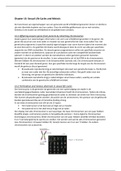College aantekeningen
quantitative analysis
- Vak
- Instelling
These notes provide a thorough overview of quantitative analysis techniques used in data evaluation and decision-making. Topics include statistical methods, regression analysis, probability, hypothesis testing, and data modeling. The material covers essential concepts such as descriptive and infere...
[Meer zien]




